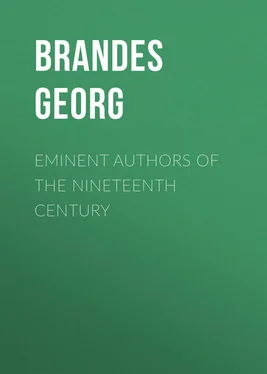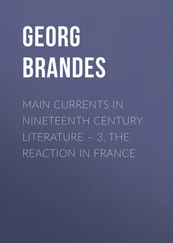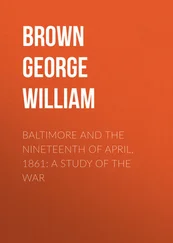Georg Brandes - Eminent Authors of the Nineteenth Century
Здесь есть возможность читать онлайн «Georg Brandes - Eminent Authors of the Nineteenth Century» — ознакомительный отрывок электронной книги совершенно бесплатно, а после прочтения отрывка купить полную версию. В некоторых случаях можно слушать аудио, скачать через торрент в формате fb2 и присутствует краткое содержание. Жанр: foreign_antique, foreign_prose, на английском языке. Описание произведения, (предисловие) а так же отзывы посетителей доступны на портале библиотеки ЛибКат.
- Название:Eminent Authors of the Nineteenth Century
- Автор:
- Жанр:
- Год:неизвестен
- ISBN:нет данных
- Рейтинг книги:5 / 5. Голосов: 1
-
Избранное:Добавить в избранное
- Отзывы:
-
Ваша оценка:
- 100
- 1
- 2
- 3
- 4
- 5
Eminent Authors of the Nineteenth Century: краткое содержание, описание и аннотация
Предлагаем к чтению аннотацию, описание, краткое содержание или предисловие (зависит от того, что написал сам автор книги «Eminent Authors of the Nineteenth Century»). Если вы не нашли необходимую информацию о книге — напишите в комментариях, мы постараемся отыскать её.
Eminent Authors of the Nineteenth Century — читать онлайн ознакомительный отрывок
Ниже представлен текст книги, разбитый по страницам. Система сохранения места последней прочитанной страницы, позволяет с удобством читать онлайн бесплатно книгу «Eminent Authors of the Nineteenth Century», без необходимости каждый раз заново искать на чём Вы остановились. Поставьте закладку, и сможете в любой момент перейти на страницу, на которой закончили чтение.
Интервал:
Закладка:
Andersen somewhere remarks, that he has made attempts in pretty much every radiation of the nursery story. This remark is striking and good. His nursery stories form a complete whole, a web with manifold radiations, that seems to address the beholder in the words of the spider's web in "Aladdin," "See how the threads can become entwined in the delicate net!" If it will not seem too much like bringing the dust of the schoolroom into the parlor, I should like to call the reader's attention to a celebrated scientific work in Adolf Zeising's "Æsthetic Investigations," in which can be found a complete series of æsthetic contrasts, in all their different phases (the beautiful, the comic, the tragic, the humorous, the touching, etc.), arranged in one great star, just as Andersen has planned in respect to his nursery stories.
The form of fancy and the method of narration in the nursery story admit the treatment of the most heterogeneous materials in the most varied tones. Within its province may be found sublime narratives, as "The Bell"; profound and wise stories, as "The Shadow"; fantastically bizarre, as "The Elfin Mound"; merry, almost wanton ones, as "The Swineherd," or "The Leap Frog "; humorous ones, as "The Princess on the Pea," "Good Humor," "The False Collar," "The Lovers"; also stories with a tinge of melancholy, as "The Constant Tin Soldier"; deeply pathetic poetic creations, as "The Story of a Mother"; oppressively dismal, as "The Red Shoes"; touching fancies, as "The Little Sea-Maid"; and those of mingled dignity and playfulness, as "The Snow Queen." Here we encounter an anecdote like "A Great Sorrow," which resembles a smile through tears, and an inspiration like "The Muse of the Coming Age," in which we feel the pinion strokes of history, the heart-throbs and pulse-beats of the active, stirring life of the present, as violent as in a fever, and yet as healthy as in a happy moment of enthusiastic inspiration. 30 30 There is not a single Danish poet, who, to such a degree as Andersen, has scorned to produce effect through the romance of the past; even in the nursery story, which from the beginning has been handled by the romantic school of Germany in a manner that can he compared with the style of the Middle Ages, he is always solely and entirely in the present. He, as well as Oersted, dares to sacrifice the interesting element in his enthusiasm for King John and his time, and he heartily joins with Ovid in exclaiming, — Prisca juvent alios! ego me nunc denique natum Gratulor. Haec aetas moribus apta meis. – ARS. AMAT. III. 121.
In short, we find everything that lies between the epigram and the hymn.
Is there, then, a boundary line which limits the nursery story, a law which binds it? If so, where does it lie? The law of the nursery story lies in the nature of the nursery story, and its nature is dependent on that of poetry. If, at the first moment, it would seem that nothing is prohibited a species of poetic creation which can permit a princess to feel a pea through twenty mattresses and twenty eider-down beds, it is but a semblance. The nursery story, which unites unbridled freedom of invention with the restraint its central idea impresses upon it, must steer between two rocks: between the luxuriance of style that lacks ideas, and dry allegory; it must strike the medium course between too great fulness and too great meagreness. This, Andersen most frequently succeeds in doing, and yet not always. Those of his stories that are based on materials derived from folk-lore, as "The Flying Trunk," or those that may be classed with the fairy-tale proper, as "Thumbling," do not attract grown people as they do children, because the story in such instances conceals no thought. In his "Garden of Paradise" everything preceding the entrance to the garden is masterly, but the Fairy of Paradise herself seems to me to be invested with little, if any, beauty or charm. The opposite extreme is when we see the barren intention, the dry precept, through the web of poetic creation; this fault, as might be expected in our reflecting and conscious age, is one of more frequent occurrence. We feel it keenly because the nursery story is the realm of the unconscious. Not only are unconscious beings and objects the leaders of speech in it, but what triumphs and is glorified in the nursery story is this very element of unconsciousness. And the nursery story is right; for the unconscious element is our capital and the source of our strength. The reason why the travelling companion could receive aid from the dead man, was because he had entirely forgotten that he had formerly helped this same dead man, and even simple Hans gains the princess and half the kingdom, because with all his folly he is so exceedingly naïve. Even stupidity has its genial side and its good luck; with the poor intermediate beings, the Nureddin natures alone, the nursery story knows not what to do.
Let us consider some instances of sins against the unconscious. In the beautiful story of "The Snow Queen" a most disturbing influence is exercised by the scene where the Snow Queen requests little Kay to make figures with the ice puzzle for the understanding, and he is unable to represent the word "Eternity." There is also clumsy and un-poetic bluntness in "The Neighboring Families" whenever the sparrow's family mention the rose by the abstract, and for a sparrow rather unnatural, term, "the beautiful." It would have been understood, without this hint, that the roses were the representatives of the beautiful in the narrative, and in encountering this abstract word in the nursery story we recoil as though we had come into contact with a slimy frog.
This tendency to allegory in narratives for children appears most frequently, as might be expected, in the form of instruction and moralizing; in some of the nursery stories, as in "The Buckwheat," the pedagogic element plays an exaggerated rôle. In others, as "The Flax," we feel too strongly at the conclusion – as in Jean Paul – the tendency to exhibit, in season and out of season, the doctrine of immortality. Toward the end of the latter story a few little, somewhat "insipid beings" are created who announce that the song is never done. In some cases finally the tendency is more personal. A whole series of stories ("The Duckling," "The Nightingale," "The Neighboring Families," "The Daisy," "The Snail and The Rose-Tree," "Pen and Inkstand," "The Old Street Lamp") allude to the poet's life and the poet's lot, and in single cases we see traces – a rare exception with Andersen – of invention being dragged in forcibly in order to bring out the tendency. What sense and what conformity to nature is there, for instance, in the fact that the street lamp can only let others see the beautiful and symbolic sights that had been interwoven with its experience when it is provided with a wax candle, and that its faculties are useless when provided with an ordinary light? It is quite incomprehensible until we conceive it to be an allegory on a poet's supposed need of prosperity in order to accomplish anything. "And so genius must run after cupboard lore!" wrote Kierkegaard on the occasion of the appearance of "Only a Fiddler." Still more infelicitous is the scene where the street lamp, in its melted-down condition, in its other life, finds its way to a poet and thus fulfils its destiny. So strongly as this the tendency has rarely shown itself.
Конец ознакомительного фрагмента.
Текст предоставлен ООО «ЛитРес».
Прочитайте эту книгу целиком, купив полную легальную версию на ЛитРес.
Безопасно оплатить книгу можно банковской картой Visa, MasterCard, Maestro, со счета мобильного телефона, с платежного терминала, в салоне МТС или Связной, через PayPal, WebMoney, Яндекс.Деньги, QIWI Кошелек, бонусными картами или другим удобным Вам способом.
Читать дальшеИнтервал:
Закладка:
Похожие книги на «Eminent Authors of the Nineteenth Century»
Представляем Вашему вниманию похожие книги на «Eminent Authors of the Nineteenth Century» списком для выбора. Мы отобрали схожую по названию и смыслу литературу в надежде предоставить читателям больше вариантов отыскать новые, интересные, ещё непрочитанные произведения.
Обсуждение, отзывы о книге «Eminent Authors of the Nineteenth Century» и просто собственные мнения читателей. Оставьте ваши комментарии, напишите, что Вы думаете о произведении, его смысле или главных героях. Укажите что конкретно понравилось, а что нет, и почему Вы так считаете.












